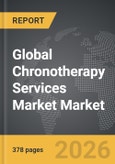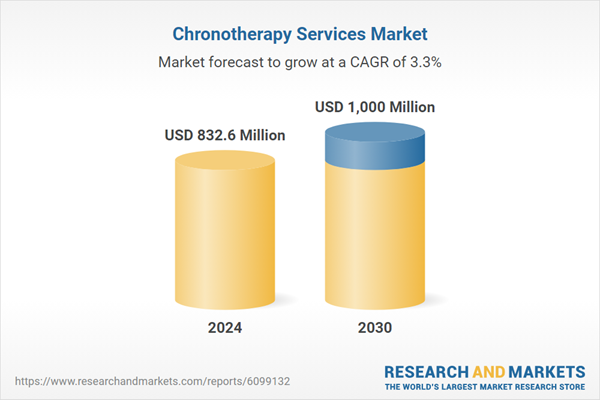Global Chronotherapy Services Market - Key Trends & Drivers Summarized
Why Is Chronotherapy Gaining Clinical Momentum as a Time-Optimized Therapeutic Strategy?
Chronotherapy - the strategic timing of medical treatment to align with the body's circadian rhythms - is emerging as a paradigm shift in personalized medicine. Scientific evidence continues to demonstrate that the body's biological clock regulates key physiological functions such as hormone secretion, metabolism, immune response, and cell proliferation. Administering therapies in sync with these circadian cycles can significantly improve efficacy and reduce toxicity, particularly in chronic conditions like hypertension, asthma, cancer, rheumatoid arthritis, and psychiatric disorders.As understanding of chronobiology deepens, healthcare systems are beginning to integrate time-of-day precision into drug administration, radiation therapy, behavioral interventions, and disease management protocols. Chronotherapy services extend beyond simple scheduling - they encompass circadian diagnostics, personalized treatment plans, and timing algorithms powered by biomarker data and wearable technology. This approach is becoming increasingly relevant amid growing demand for precision therapeutics, outcome-based care, and patient-centric treatment optimization.
How Are Technological Innovations and Wearables Enabling Scalable Delivery of Chronotherapy Services?
Digital health platforms and biometric wearables are playing a critical role in operationalizing chronotherapy by enabling real-time circadian rhythm monitoring and adaptive scheduling of interventions. Devices that track sleep-wake cycles, heart rate variability, body temperature, and melatonin secretion are being used to generate individualized circadian profiles. This data informs optimal dosing windows for medications, behavioral therapy timing, and scheduling of procedures, offering clinicians a more dynamic, evidence-based approach to care delivery.Artificial intelligence and machine learning algorithms are also being employed to analyze circadian biomarkers and predict chronotype-based treatment responses. Mobile health apps, smart pill dispensers, and time-synchronized infusion systems are facilitating automated adherence to chronotherapy protocols, especially in ambulatory and home-care settings. These tools are particularly valuable in oncology, where treatment toxicity and tumor response can vary markedly by dosing time, making the precise scheduling of therapies a clinical priority.
Which Clinical Domains Are Leading the Adoption of Chronotherapy Services?
Oncology is at the forefront of chronotherapy adoption, with clinical studies showing time-of-day-dependent variability in chemotherapy efficacy and toxicity. Circadian-based scheduling is improving tolerability and therapeutic index for agents such as oxaliplatin, cisplatin, and 5-fluorouracil in colorectal, breast, and lung cancers. Chronoradiation - delivering radiotherapy at biologically optimal times - is also gaining traction in oncology clinics aiming to enhance normal tissue protection and tumor control.Beyond cancer, chronotherapy is being applied in cardiovascular disease management, where blood pressure follows a circadian rhythm and nighttime dosing of antihypertensives has been shown to improve 24-hour control and cardiovascular outcomes. In psychiatric care, mood disorders, bipolar disorder, and sleep disturbances are increasingly managed through light therapy, timed melatonin, and circadian-aligned pharmacotherapy. Neurology, pulmonology, and endocrinology are also exploring time-based interventions to improve drug metabolism, hormone regulation, and inflammatory modulation.
How Are Healthcare Systems and Payers Approaching Integration and Reimbursement of Chronotherapy Services?
While chronotherapy is scientifically validated, its integration into mainstream clinical practice remains uneven due to structural, reimbursement, and awareness challenges. Most healthcare delivery models are not yet configured to accommodate circadian-based treatment scheduling, and provider workflows often lack the flexibility to tailor interventions by time. Moreover, reimbursement for time-specific therapeutic administration is not standardized, limiting incentives for adoption.That said, pilot programs and academic medical centers are increasingly demonstrating the cost-effectiveness and clinical value of chronotherapy protocols. Health systems in Europe, Japan, and select U.S. centers are experimenting with chronomedicine clinics and integrating chronobiological principles into electronic health record systems and treatment guidelines. Payers are beginning to explore coverage models that support circadian-aligned care, particularly for high-burden conditions where optimized timing can reduce adverse events, improve medication adherence, and avoid hospitalizations.
Can Chronotherapy Services Evolve into a Mainstream Pillar of Precision Medicine Across Global Markets?
Chronotherapy holds significant promise as a cross-cutting innovation that can improve treatment outcomes by harnessing the body's natural rhythms. However, its mainstreaming will depend on the development of scalable delivery models, provider training, and clear clinical protocols across disease areas. Broad acceptance will require robust real-world evidence, stakeholder education, and economic validation to convince clinicians and payers of its systemic benefits.As healthcare pivots toward personalization, efficiency, and preventative care, the critical question becomes: Can chronotherapy services mature into a widely adopted precision medicine tool - delivering time-aligned, patient-specific interventions at scale while addressing operational, regulatory, and access barriers across diverse health systems?
Report Scope
The report analyzes the Chronotherapy Services market, presented in terms of market value (US$). The analysis covers the key segments and geographic regions outlined below:- Segments: Product Type (Chronotherapy Systems, Chronotherapy Drugs); Therapeutic Area (Oncology, Neurology, Cardiovascular Diseases, Respiratory Diseases, Other Therapeutic Areas); End-Use (Hospitals & Clinics, Homecare Settings, Other End-Uses).
- Geographic Regions/Countries: World; United States; Canada; Japan; China; Europe (France; Germany; Italy; United Kingdom; Spain; Russia; and Rest of Europe); Asia-Pacific (Australia; India; South Korea; and Rest of Asia-Pacific); Latin America (Argentina; Brazil; Mexico; and Rest of Latin America); Middle East (Iran; Israel; Saudi Arabia; United Arab Emirates; and Rest of Middle East); and Africa.
Key Insights:
- Market Growth: Understand the significant growth trajectory of the Chronotherapy Systems segment, which is expected to reach US$658.1 Million by 2030 with a CAGR of a 4.1%. The Chronotherapy Drugs segment is also set to grow at 1.9% CAGR over the analysis period.
- Regional Analysis: Gain insights into the U.S. market, valued at $226.8 Million in 2024, and China, forecasted to grow at an impressive 6.3% CAGR to reach $201.5 Million by 2030. Discover growth trends in other key regions, including Japan, Canada, Germany, and the Asia-Pacific.
Why You Should Buy This Report:
- Detailed Market Analysis: Access a thorough analysis of the Global Chronotherapy Services Market, covering all major geographic regions and market segments.
- Competitive Insights: Get an overview of the competitive landscape, including the market presence of major players across different geographies.
- Future Trends and Drivers: Understand the key trends and drivers shaping the future of the Global Chronotherapy Services Market.
- Actionable Insights: Benefit from actionable insights that can help you identify new revenue opportunities and make strategic business decisions.
Key Questions Answered:
- How is the Global Chronotherapy Services Market expected to evolve by 2030?
- What are the main drivers and restraints affecting the market?
- Which market segments will grow the most over the forecast period?
- How will market shares for different regions and segments change by 2030?
- Who are the leading players in the market, and what are their prospects?
Report Features:
- Comprehensive Market Data: Independent analysis of annual sales and market forecasts in US$ Million from 2024 to 2030.
- In-Depth Regional Analysis: Detailed insights into key markets, including the U.S., China, Japan, Canada, Europe, Asia-Pacific, Latin America, Middle East, and Africa.
- Company Profiles: Coverage of players such as Abbott Laboratories, Acrostak Int. Distr. Sàrl, AngioDynamics, Inc., Asahi Intecc Co., Ltd., B. Braun Melsungen AG and more.
- Complimentary Updates: Receive free report updates for one year to keep you informed of the latest market developments.
Some of the 42 companies featured in this Chronotherapy Services market report include:
- AbbVie Inc.
- Amgen Inc.
- AstraZeneca plc
- Bayer AG
- BioTime, Inc.
- Bristol-Myers Squibb Company
- ChronoLife SAS
- Circadian Therapeutics Ltd.
- Eli Lilly and Company
- GlaxoSmithKline plc
- Johnson & Johnson
- Koninklijke Philips N.V.
- Lumos Labs, Inc.
- Medtronic plc
- Novartis AG
- Pfizer Inc.
- ProSomnus Sleep Technologies
- ResMed Inc.
- Sanofi S.A.
- Teva Pharmaceutical Industries Ltd.
This edition integrates the latest global trade and economic shifts into comprehensive market analysis. Key updates include:
- Tariff and Trade Impact: Insights into global tariff negotiations across 180+ countries, with analysis of supply chain turbulence, sourcing disruptions, and geographic realignment. Special focus on 2025 as a pivotal year for trade tensions, including updated perspectives on the Trump-era tariffs.
- Adjusted Forecasts and Analytics: Revised global and regional market forecasts through 2030, incorporating tariff effects, economic uncertainty, and structural changes in globalization. Includes historical analysis from 2015 to 2023.
- Strategic Market Dynamics: Evaluation of revised market prospects, regional outlooks, and key economic indicators such as population and urbanization trends.
- Innovation & Technology Trends: Latest developments in product and process innovation, emerging technologies, and key industry drivers shaping the competitive landscape.
- Competitive Intelligence: Updated global market share estimates for 2025, competitive positioning of major players (Strong/Active/Niche/Trivial), and refined focus on leading global brands and core players.
- Expert Insight & Commentary: Strategic analysis from economists, trade experts, and domain specialists to contextualize market shifts and identify emerging opportunities.
Table of Contents
Companies Mentioned (Partial List)
A selection of companies mentioned in this report includes, but is not limited to:
- AbbVie Inc.
- Amgen Inc.
- AstraZeneca plc
- Bayer AG
- BioTime, Inc.
- Bristol-Myers Squibb Company
- ChronoLife SAS
- Circadian Therapeutics Ltd.
- Eli Lilly and Company
- GlaxoSmithKline plc
- Johnson & Johnson
- Koninklijke Philips N.V.
- Lumos Labs, Inc.
- Medtronic plc
- Novartis AG
- Pfizer Inc.
- ProSomnus Sleep Technologies
- ResMed Inc.
- Sanofi S.A.
- Teva Pharmaceutical Industries Ltd.
Table Information
| Report Attribute | Details |
|---|---|
| No. of Pages | 378 |
| Published | January 2026 |
| Forecast Period | 2024 - 2030 |
| Estimated Market Value ( USD | $ 832.6 Million |
| Forecasted Market Value ( USD | $ 1000 Million |
| Compound Annual Growth Rate | 3.3% |
| Regions Covered | Global |









